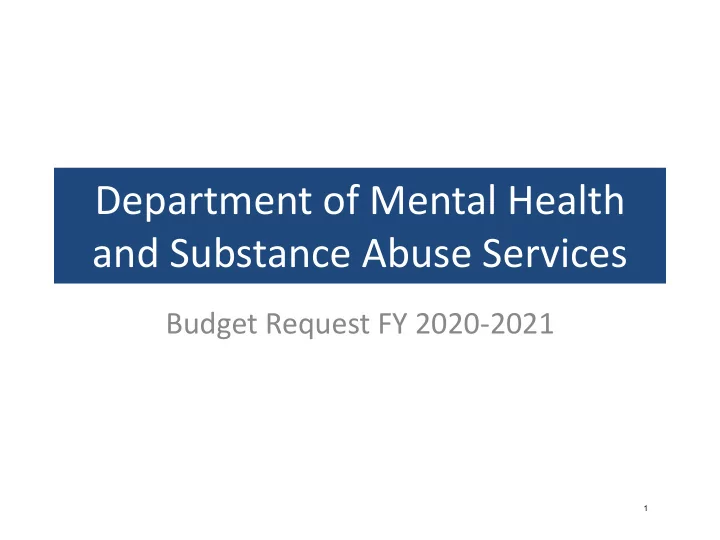

Department of Mental Health and Substance Abuse Services Budget Request FY 2020-2021 1
About the Department FY2021 Base Budget Administration: $24,888,900 Regional Mental Health Community Services: Institutes: $157,731,100 $221,867,100 Substance Abuse Services, Middle TN, $55,418,200 • • $98,420,800 Western TN, $39,717,200 • Mental Health Services, Moccasin Bend, $41,207,500 • • $123,446,300 Memphis, $20,938,200 • Major Maintenance, $450,000 • In partnership with local consumer, provider, family-led, and faith-based agencies, provide a • comprehensive array of services for children, youth, and adults with or at risk of serious and persistent mental illness, serious emotional disturbance, and substance-related disorders Coordinate, license, and provide leadership to a system of approximately 300 community • service providers, operate four Regional Mental Health Institutes (RMHIs), and contract for three private inpatient facilities in order to serve more than 300,000 individuals a year Operate Behavioral Health Safety Net, Crisis Continuum, System of Care, Clinical Substance • Abuse Treatment Continuum, Recovery Courts, Criminal Justice, Faith-Based Initiatives and 2 other life-saving programs
Change in Appropriations $350 Millions $306 $290 $300 $260 $253 $250 $223 $200 $150 $100 $50 $0 FY17 FY18 FY19 FY20 FY21 3
Change in Positions 2,000 1,870 1,855 1,858 1,845 1,846 1,500 1,000 500 0 FY17 FY18 FY19 FY20 FY21 4
Substance Use Prevalence Data 2018 Tennesseans, ages 12+: 385,000 were estimated to have a substance use disorder (6.7% of 5,777,403 Tennesseans, all estimates rounded to nearest 1,000) 18,000 Estimated Gap Population 346,000 (89.9%) Estimated number 39,000 (10.1%) eligible to be served Estimated number with through private or public no insurance insurance 21,000 Tennesseans served by TDMHSAS treatment and recovery services in FY19 Sources: (1) National Survey on Drug Use and Health 2016-2017; (2) U.S. Census population and insurance estimates for Tennessee 2018. 5 Notes: (1) Substance Use Disorder is defined as meeting criteria for illicit drug or alcohol dependence or abuse. Dependence or abuse is based on definitions found in the 4th edition of Diagnostic and Statistical Manual of Mental Disorders (DSM-IV).
Mental Health Prevalence Data 2018 Tennesseans, ages 9+: 473,000 were estimated to have a serious mental illness or serious emotional disturbance (7.87% of 6,013,911 Tennesseans, all estimates rounded to nearest 1,000) 6,550 Estimated Gap Population 425,000 (89.9%) Estimated number 7,000 eligible to be served Estimated through private or public 48,000 (10.1%) Tennesseans insurance served by new Estimated number with BHSN funds in no insurance FY20 34,450 Tennesseans served by Behavioral Health Safety Net in FY19 6 Sources: (1) National Research Institute, 2018. (2) U.S. Census population estimates 2018. Note: NRI prepares estimated counts annually by state. SED is estimated for ages 9-17. SMI is estimated for ages 18+
Cost Increases Total State Federal Other Pos. 1. Substance Abuse Clinical Treatment $6,000,000 $6,000,000 $0 $0 0 Enhancement 2. Children’s Behavioral Health Safety 7,571,800 7,571,800 0 0 0 Net 3. Mobile Crisis Services Expansion 354,300 354,300 0 0 0 4. Creating Jobs Initiative Expansion 900,000 900,000 0 0 0 5. Addiction Recovery Program 1,000,000 1,000,000 0 0 0 Enhancement 6. Criminal Justice Liaison Expansion 625,000 625,000 0 0 0 7. School Based Behavioral Health 3,014,300 3,014,300 0 0 1 Liaison Expansion 7
Cost Increases Total State Federal Other Pos. 8. System of Care Across Tennessee $330,700 $330,700 $0 $0 3 (SOCAT) 9. Director of School Engagement 119,000 119,000 0 0 1 10. The Office of Housing and Homeless 83,200 83,200 0 0 1 Services Program Manager 11. Suicide Prevention Programs Program 101,300 101,300 0 0 1 Director 12. Juvenile Justice Program Director 125,300 125,300 0 0 1 13. Major Maintenance 250,000 250,000 0 0 0 14. Facilities Revolving Fund Rent for new 238,700 238,700 0 0 0 Regional Intervention Program facility Total Cost Increases $20,713,600 $20,713,600 $0 $0 8 8
Efficiency Plan Total State Federal Other Pos. 1. Reduce funding for contract staff at ($595,000) ($595,000) ($0) ($0) (0) the Regional Mental Health Institutes 2. Convert a contracted Revenue Cycle (65,000) (65,000) (0) (0) 1 Manager to a full-time position 3. Recognize operational efficiencies in (95,000) (95,000) (0) (0) (0) travel, supplies, etc. in the Central Office 4. Transition from contractor oversight to (75,000) (75,000) (0) (0) (0) internal oversight for Tennessee Move Initiative Total Efficiency Plan ($830,000) ($830,000) ($0) ($0) 1 9
Recommend
More recommend